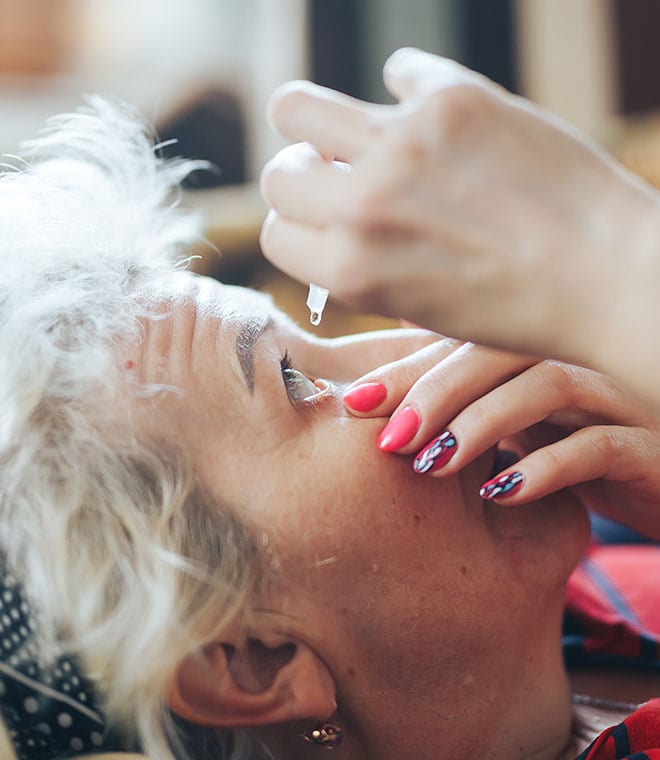Health
Macular degeneration treatment
By Andy Stergachis, PhD, BPharm May 16, 2025 • 5 min
Macular degeneration is a leading cause of vision loss among Americans age 50 and older. Also called “age-related macular degeneration (AMD),” this condition affects your sharp, central vision. This is vision that you need for activities such as reading and driving. Eye doctors can check for macular degeneration as part of a comprehensive, dilated eye exam.
Macular degeneration affects a part of your eye called the macula. There are two types of macular degeneration: wet and dry.
- Wet macular degeneration happens when abnormal blood vessels grow under the macula. These new blood vessels often leak blood and fluid. Wet macular degeneration damages the macula quickly. It can be more serious, causing more rapid vision loss compared to dry macular degeneration.
- Dry macular degeneration happens when the light-sensitive cells in the macula slowly break down. People with dry macular degeneration gradually lose their central vision over time. Dry macular degeneration is more common than wet macular degeneration.
Macular degeneration treatments depend upon the type and the stage of disease progression. While there is no cure, early detection and treatment can slow vision loss.
Wet macular degeneration treatment
1. Anti-VEGF therapy: The most common treatment for wet macular degeneration is anti-vascular endothelial growth factor or anti-VEGF therapy. Anti-VEGF treatment helps block the number of abnormal blood vessels in the retina. It also slows any leaking from blood vessels. Researchers report high rates of success with anti-VEGF injections, including receding blood vessels behind the retina, a far slower progression of the disease, and, in some cases, moderate gains made in vision.
Anti-VEGF medications used to treat wet macular degeneration include bevacizumab (Avastin), ranibizumab (Lucentis), aflibercept (Eylea), brolucizumab (Beovu) and faricimab-svoa (Vabysmo). Each of these medicines works in a different way to inhibit blood vessel growth. The anti-VEGF medicine is injected into your affected eye through a very slender needle. The shot is usually not painful because the eye has been anesthetized. You will likely need repeated treatment during follow-up visits to maintain the beneficial effect of the medication.
Possible side effects of eye injections include eye pain, floaters, increased eye pressure, infection and eye inflammation.
2. Laser therapy: Laser surgery with high-energy laser light may also be used to treat some types of wet AMD. The laser light beam reduces the number of vessels and slows leaking. Another treatment is called photodynamic laser therapy. This involves injecting a light-sensitive drug into the body, followed by the doctor shining a laser into the eye to activate the drug. This damages the abnormal blood vessels.
Dry macular degeneration treatment
Studies have shown a potential benefit from a special combination of vitamins and minerals. A large study by the National Eye Institute of the National Institutes of Health, called AREDS (Age-Related Eye Disease Study), showed that for people with intermediate or advanced dry macular degeneration, daily intake of vitamin C, vitamin E, lutein, zeaxanthin, zinc oxide and copper can slow the progression of the disease. The benefits of the AREDS nutrient formulation have persisted over time for people who participated in the AREDS study. The AREDS formula may also be helpful for people with wet AMD in one eye who have lost vision from dry AMD in the other eye.
Your ophthalmologist can tell you if vitamins and minerals are recommended for your dry macular degeneration. Some nutritional supplements may interfere with certain medications. For this reason, people who are considering taking an AREDS formulation should talk with their healthcare provider about their medications, including all dietary supplements, over-the-counter drugs and prescription medicines.
Updated by Julie McDaniel, MSN, RN, CRNI, May 2025.
Sources:
- https://www.aao.org/eye-health/diseases/amd-macular-degeneration
- https://www.mayoclinic.org/diseases-conditions/wet-macular-degeneration/diagnosis-treatment/drc-20351113
- https://medlineplus.gov/maculardegeneration.html
- https://www.macular.org/treatments
- https://www.nei.nih.gov/research/clinical-trials/age-related-eye-disease-studies-aredsareds2
- https://www.nei.nih.gov/research/clinical-trials/age-related-eye-disease-studies-aredsareds2/aredsareds2-frequently-asked-questions
- https://www.cdc.gov/vision-health/about-eye-disorders/age-related-macular-degeneration.html
- https://www.macular.org/about-macular-degeneration/what-is-macular-degeneration/types
- https://www.uptodate.com/contents/age-related-macular-degeneration#H3407705071
- https://www.health.harvard.edu/diseases-and-conditions/macular-degeneration-will-a-supplement-cocktail-slow-it-down
- https://www.aao.org/eye-health/diseases/vitamins-amd



